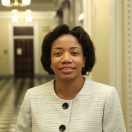

What are the words that describe my reaction to this Champion of Change award? Surprised. Excited. Humbled. Then, challenged.
Challenged because of the opportunity to further a conversation. Challenged to find answers to an important, national problem. Challenged, really, to ask the right questions.
Questions, after all, are what really spur the STEM practitioner.
In my professional life, I am always questioning. What’s really the problem? What’s the best approach? What’s the worst that can happen? In my professional life, I create “things”—medical devices, teams, plans.
In my “spare time,” I also create things. And, I hope that I have taken my best skills—and a small army of dedicated team members—to create something about which I am proud and passionate: We call it “Tech Savvy.”
"Tech Savvy" is a little hard for me to describe in a blog; I always start by giving descriptors for the event: Hundreds of middle school girls and their parents and teachers. Fun technology workshops where students type DNA, unearth fossils, and learn about polymers from gumdrops. Illuminating parent and teacher sessions. A (hopefully) cool theme. “Savvy skills” workshops including negotiation, interviewing skills, ethics. SAT prep for high school students. Mentoring opportunities.
However, for me, "Tech Savvy" isn’t just about the event. "Tech Savvy" is about creating a culture. There are two key components of such a culture: providing girls with multiple possibilities for their future and an environment – home, school, industry—that is supportive of diversity in STEM.
Students leave their workshops pondering how they can solve future problems —resource shortages, medical challenges, disaster preparedness. Hopefully, they leave with more questions, than answers—and lots of enthusiasm and the support to start working on those questions.
Today, as I ponder issues concerning women and STEM, I revert back to the questions from my professional life:
What’s the problem? Simply: Girls continue to reference society’s gender-stereotypical views of STEM. Females are disproportionately represented in many STEM fields; too many young women exit undergraduate engineering programs. Industry retention of female talent is low. The result: Lack of a sufficient STEM “pipeline”.
What’s at stake? For women, the consequences include a very real economic impact and the inability to reach full professional potential. These consequences are weighty.
However, there is another compelling consequence. An insufficient STEM pipeline results in an under-competitive national workforce. This is not a women’s issue; it is a national concern.
The cost has never been greater. America’s future depends upon having a prepared, technological workforce, one that addresses the problems of tomorrow today. There is no doubt that technology and agile approaches are keys to our nation’s competiveness. In order to lead, we need all of our best talent-- prepared and on board. These talented folks must be active in our labs and engaged throughout industry. They have to be present in our colleges -- and actively encouraged in middle school science and math classes. The talent has to exist throughout the entire pipeline.
So one more important, final question: Where and when do we begin?
The challenge is to change the culture.
My own “can-do” spirit for STEM began in my hometown of Vicksburg and was encouraged in Nashville. I have had a chance to pass it along in Buffalo. I look forward to continuing to do so.
The challenge is, in part, for each of us-- at home or community, your school, and in industry. You can further a supportive culture for women in STEM-- wherever you are. There is no time to wait.
Tamara E. Brown is the founder of the AAUW Tech Savvy program. A chemical and biomedical engineer, she is past president of AAUW Buffalo New York and a member of AAUW’s national Leadership Corps.


